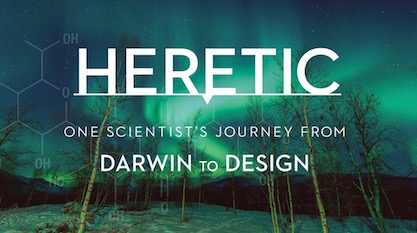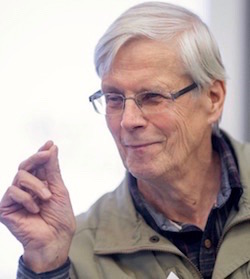 Evolution
Evolution
 Intelligent Design
Intelligent Design
Heretic Is for the ID Critic, or the Curious Reader, in Your Life


The latest title from Discovery Institute Press is Heretic: One Scientist’s Journey from Darwin to Design, by Matti Leisola and Jonathan Witt. Yesterday on Twitter we had the opportunity to recommend it to an ID critic who wrote a book chapter on intelligent design without doing his homework. (He’s not the first.) David Klinghoffer initially suggested that Dr. Greg Cootsona read several of the most recent heavy-weight ID-related texts, including the 1,000+ page Theistic Evolution volume, and then share his assessment at BioLogos, where Cootsona is an Advisory Council member.
When Cootsona seemed to shy from such an assignment, David suggested Heretic as a brief and highly accessible introduction to ID, wrapped in an engaging personal account of scientific discovery. We even offered to send him a copy, no charge!
Thanks. Much less time consuming would be to review the new book Heretic, which works as a very accessible intro to ID. We can send you a copy. (I admit I myself have mispelled Matti Leisola’s name. It’s a tough one and spell check doesn’t like it.) https://t.co/AMh7TQR7zP
— David Klinghoffer (@d_klinghoffer) June 7, 2018
The offer still stands, and we repeat it now while also taking note of a threshold for the book. Heretic just reached the 50-review mark at Amazon, averaging an encouraging 4.8 out of 5 stars. Very nice! Thanks to all who have weighed in there so far.
Thanks for the Drive-By!

The vast majority of reviews are glowing, but the drive-by attacks may do more than all the positive reviews combined to point up the book’s strengths. That’s because when the best a critic can throw at a work is name-calling and misinformation, you have good reason to suspect that the book’s arguments are strong.
One such review concedes that Matti Leisola is a scientist who knows his stuff, but the critic concludes from this that he must then be dishonest to argue for design. One proof the critic offers is the book’s handling of the fossil record and Leisola’s claim that even mainstream paleontologists concede that there remains a stubborn pattern of abrupt appearance and stasis in the fossil record, a pattern that doesn’t mesh well with neo-Darwinian gradualism. The critic accuses Leisola of quote-mining and tosses around terms like “garbage.” Meanwhile, the widespread pattern of abrupt appearance and stasis in the fossil record persists. A good recent article by our colleague Günter Bechly, the distinguished German paleontologist, details how the latest case of Darwinist bluffing to the contrary is only that — more bluffing.
Another critical commenter quotes Matti Leisola out of context: “It was so clear to me: Instead of plugging away to discover the natural mechanism for this or that mystery about the natural world, these pro-design people threw up their hands and used the God-did-it explanation as a cover for ignorance.” Then the commenter writes, “That’s not evidence — that’s a denial of the evidence for evolution.”
Not Even Wrong
Strange. The critic’s comment, as the saying goes, “isn’t even wrong.” In the Leisola quotation, the bioengineer is describing what his view of intelligent design was back when he was a committed Darwinist, early in his scientific career. Leisola goes onto explain how he came to realize that such a view of ID was bogus and that the “God-of-the-gaps” criticism of ID contained within it a criticism of dogmatic Darwinists as well.
I came to realize that this criticism cuts both ways, since a functional atheist also can reach for pat explanations in the face of mystery. It’s just that for him, the pat explanation will never be God. That is, you do not need God in your explanatory toolkit in order to short-circuit careful scientific investigation and reasoning. I realized that I myself had been all too willing to stuff vague materialistic explanations into the gaps of our scientific knowledge.
Heretic goes on from there to champion another approach — inference to the best explanation, no holds barred, and following the evidence wherever it leads. Leisola and Witt argue that intelligent design is a better, more causally adequate explanation for things like the information-rich properties of living cells. That a critic of the book is reduced to quoting Leisola out of context and following it with a dismissive non sequitur is telling. When you’ve really got the evidential goods on your opponent, there’s no need to stoop to such tactics.
Now for the Good Stuff
The great majority of the 50 reviews are strongly positive. Here is sampling. And again, thanks to all of you who weighed in. There is strength in numbers!
R. Holden
Leisola’s journey as a scientist is instructive. His career has been in both academia and industry with peer reviewed articles and patents to his name….Leisola is calling for more academic freedom not less. He notes that he has found four responses among scientists to ID ideas: flight, frothing at the mouth denunciation, encouragement, and the most rare, civil discourse with those who disagree. May this book find more of the latter.
Ola Hössjer (Stockholm University)
Heretic is written by Matti Leisola and Jonathan Witt. It tells the most fascinating life story of Leisola, a well-known bioengineering professor and former research director of an international biotech company…starting as a supporter of Darwinian evolution, then gradually increasing his skepticism towards the theory and finally becoming an advocate of intelligent design.
Second, the book unfolds the dramatic revolution in genomics and molecular biology that took place during the last forty years. Leisola explains with great expertise, and from his own working experience as a researcher, that the power of mutations, natural selection, and other blind mechanisms is very limited — they can only modify existing structures in modest ways. He argues convincingly that all such materialistic processes have failed to account for the big diversity we see in life.
Heretic is a great book about a scientific subject which is readable for most non-scientists. It again provides another nail in the evolution coffin. It is extremely well written, funny, and you simply don’t want to put it away when you first get started reading. Heretic is written by an eminent scientist who has done research outside academia. In the private sector of biochemical research you are not bound by theoretical dogmas like evolution. Results cannot be twisted to confirm a certain philosophical paradigm such as the evolutionary framework. Leisola knows what works and what doesn’t because that is what matters. And his conclusion regarding evolution is absolutely clear; it doesn’t work. He gives a bunch of arguments from biochemistry of why evolution cannot work, and it is overwhelmingly convincing.
Michael Schmicker
Very interesting book. I’m somewhat surprised at how strong the scientific evidence for intelligent design is. You have to approach the subject of the theory of evolution with an open mind, and focus on the offered evidence. That’s simply good science. Read both sides, then decide for yourself. That’s simply your responsibility as a curious, rational human being.
Pettigrew
I enjoyed this book very much and having come through the academic ranks with a similar trajectory of experiences and conclusions, I appreciate Matti’s candor and tenacity to follow the data. This book is suitable for the lay public interested in the evolution/design debate but carries weight for the scientists as well. Dr. Leisola’s contributions to enzymology cannot be ignored (see Chap 10) — he is a hardcore biologist that has met the test of peer review and grantsmanship and thus deserves to be listened to on this topic.
Arjun L Sen
A thoroughly considered and extremely well expressed case for intelligent design by a top scientist and expert in biotechnology, carefully working through the inadequacy of the materialist blind evolution model.
One paragraph in this book says it all: “Evolution is slow except when it is fast. It is dynamic and makes huge changes over time, except when it keeps everything the same for millions of years. It explains extreme complexity and elegant simplicity. It teaches us how birds learn to fly, and yet also lose that ability. Evolution made cheetahs fast and turtles slow. Some creatures it made big and others small; some gloriously beautiful and others boringly gray. It forced fish to walk and walking animals to return to the sea. It diverges except when it converges; it produces exquisitely fine-tuned designs except when it produces junk. Evolution is random and without direction except when it moves toward a target. Life under evolution is a cruel battlefield except when it displays altruism. And does all this with a growing number of hypotheses. Modern evolutionary theory is the Rube Goldberg of theoretical constructs. And what is the result of all this speculative ingenuity? Like the defunct theory of phlogiston, it explains everything while explaining nothing well.”…The first section where he discovers the actual facts that make him leave evolution (but not science) and the end sections where he gives more evidence that destroys Darwinism are priceless.
Read the endorsements, and purchase Heretic here. Get a copy for yourself, a friend, or your favorite theistic evolutionist!
